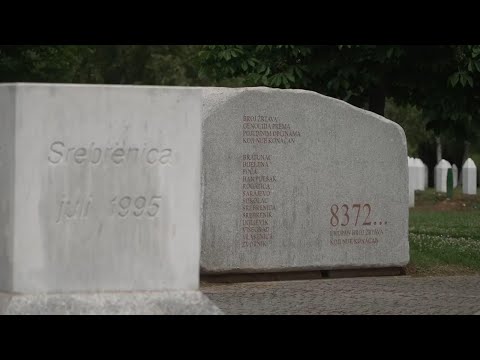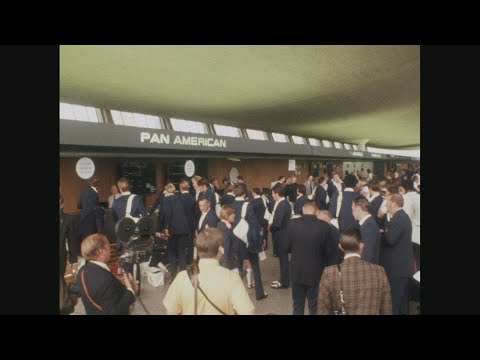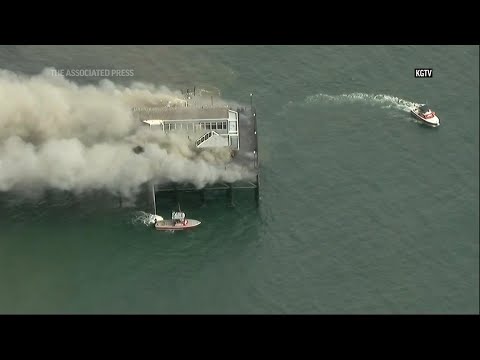(11 Jul 2024)
BOSNIA SREBRENICA ANNIVERSARY
SOURCE: ASSOCIATED PRESS
RESTRICTION SUMMARY:
LENGTH: 2:22
ASSOCIATED PRESS
ARCHIVE: Srebrenica, Bosnia – 12 July 1995
++4:3++
1. Mid of Serb soldiers securing road
2. Wide of Serb soldiers with rifles in field
3. Mid of General Ratko Mladic arriving and talking to refugees, pan to refugees crowded in road
4. Women and children refugees walking towards buses
5. Women and children boarding buses
ASSOCIATED PRESS
ARCHIVE: Cerska, near Srebrenica, Bosnia – 11 July 1996
++4:3++
6. Wide of mass graves
7. Mid of men digging
8. Close of skulls
9. Close of boots
10. Close of forensic investigator with skull in background
11. Wide of skulls and red flag markers on grave site
ASSOCIATED PRESS
ARCHIVE: Dulici, Eastern Bosnia – 11 July 1997
++4:3++
12. Pan of grave sites
13. Close of woman crying
14. Close of women praying
ASSOCIATED PRESS
ARCHIVE: Potocari, Bosnia-Herzegovina – 22 May 2024
++16:9++
15. Memorial stone, number of victims listed on memorial
16. Rose on tombstone that lists names of victims
17. Various of graves, memorial center
STORYLINE:
LEADIN:
Thursday July 11 marks 29 years since the 1995 Srebrenica genocide.
The U.N.-designated “safe haven” of Srebrenica in Bosnia-Herzegovina fell to Bosnian Serb forces, who subsequently carried out the killings of more than 8,000 Muslim men and boys.
STORYLINE:
On July 11, 1995, Bosnian Serbs overran a U.N.-protected safe area in Srebrenica.
They separated at least 8,000 Muslim Bosniak men and boys from their wives, mothers and sisters and slaughtered them.
Those who tried to escape were chased through the woods and over the mountains around the town.
The perpetrators then plowed their victims’ bodies into hastily made mass graves, which they later dug up with bulldozers, scattering the remains among other burial sites to hide the evidence of their war crimes.
The Srebrenica killings were the bloody culmination of the war, which came after the breakup of Yugoslavia unleashed nationalist passions and territorial ambitions that set Bosnian Serbs against the country’s two other main ethnic populations, Croats and Muslim Bosniaks.
The International Court of Justice, the U.N.’s highest tribunal, determined in 2007 that the acts committed in Srebrenica constituted genocide.
It was Europe’s first genocide since the Nazi Holocaust in World War II, which killed an estimated 6 million Jews and people from other minorities.
Both Serbia and Bosnian Serbs have denied that genocide happened in Srebrenica although this has been established by two U.N. courts.
The Bosnian Serb wartime political leader Radovan Karadzic and his military commander Ratko Mladic were both convicted of genocide in Srebrenica by a special U.N. war crimes tribunal in The Hague.
Earlier this year, the United Nations approved a resolution establishing an annual day to commemorate the 1995 genocide.
===========================================================
Clients are reminded to adhere to all listed restrictions and to check the terms of their licence agreements. For further assistance, please contact the AP Archive on: Tel +44(0)2074827482 Email: info@aparchive.com.
Find out more about AP Archive: http://www.aparchive.com/HowWeWork
Twitter: https://twitter.com/AP_Archive
Facebook: https://www.facebook.com/APArchives
Instagram: https://www.instagram.com/APNews/
You can license this story through AP Archive: http://www.aparchive.com/metadata/youtube/26c08466caa9479b9e903119f5c57b80
Author: AP Archive
Go to Source
News post in July 16, 2024, 6:04 am.
Visit Our Sponsor’s:
News Post In – News





